Preparing for Your First Therapy Session: Complete Guide to Success
Transform anxiety into confidence with expert preparation strategies for your first counseling appointment
📚 What You'll Discover in This Guide
- Understanding What to Expect
- Practical Preparation Steps
- What to Bring and Leave Behind
- Overcoming First Session Anxieties
- Essential Questions to Ask Your Therapist
- Setting Realistic Goals and Expectations
- Making the Most of Your First Session
- What Happens After Your First Session
- Building a Strong Therapeutic Relationship
Taking the step to schedule your first therapy session represents a courageous decision toward better mental health and personal growth. Whether you're seeking support for addiction recovery, managing anxiety and depression, or working through life transitions, preparing for your first therapy session can significantly impact the effectiveness of your treatment experience.
The anticipation and anxiety surrounding your first therapy appointment are completely normal. Research shows that proper preparation for your first therapy session can increase treatment engagement by up to 40% and improve overall therapeutic outcomes.
Many people approach their first therapy session with a mixture of hope and nervousness. Questions like "What should I say?" "Will my therapist judge me?" and "How do I even begin?" are universal concerns that even the most self-aware individuals experience. The good news is that these feelings are not only expected but can actually be transformed into productive energy when you know how to prepare effectively.
Understanding what happens during a first therapy session, how to prepare mentally and practically, and what to expect from the therapeutic process can help you maximize the benefits from day one. Whether you're considering outpatient treatment programs or individual counseling, proper preparation sets the foundation for successful therapeutic work.

Taking time to prepare can transform first session anxiety into confidence
Understanding What to Expect in Your First Therapy Session
Your therapist's primary goal during the first session is to create a safe, welcoming environment where you feel comfortable sharing your concerns. This initial appointment typically lasts 50-60 minutes and serves as an assessment and orientation session rather than deep therapeutic work. Understanding this can help alleviate pressure to "perform" or share everything immediately.
The session will likely begin with your therapist explaining confidentiality rules, their approach to therapy, and what you can expect from future sessions. This administrative component is crucial for establishing trust and understanding the therapeutic framework. Your therapist may ask you to complete some basic paperwork or intake forms if you haven't already done so.
Most therapists will ask broad questions about what brought you to therapy, your current concerns, and your goals for treatment. They're not looking for a perfect narrative or expecting you to have everything figured out. Instead, they're gathering information to understand your unique situation and determine how they can best support you.
Your therapist might ask about your history, including family background, previous therapy experiences, current stressors, and coping mechanisms you've tried. These questions help them understand the context of your current challenges and identify patterns that might be relevant to your treatment. Remember, there are no wrong answers, and it's perfectly acceptable to say you don't know or need time to think about something.
For those seeking help with addiction or co-occurring disorders, the first session might include questions about substance use patterns, triggers, and previous recovery attempts. If you're considering co-occurring disorders treatment, your therapist will assess both mental health symptoms and substance use concerns to develop an integrated treatment approach.
The pacing of your first therapy session will be entirely up to you. Some people feel ready to dive deep immediately, while others need several sessions to feel comfortable opening up. Both approaches are perfectly valid, and a skilled therapist will follow your lead while gently encouraging progress when appropriate.

Therapy offices are designed to feel comfortable and welcoming
Practical Preparation Steps for Your First Therapy Session
Effective preparation for your first therapy session begins several days before your appointment. Start by reflecting on what prompted you to seek therapy. Write down the main concerns, symptoms, or life challenges that led to this decision. This reflection helps you articulate your needs clearly during the session.
Consider creating a timeline of significant events that might relate to your current struggles. This doesn't need to be exhaustive, but noting major life changes, losses, traumas, or stressful periods can provide valuable context for your therapist. For those dealing with addiction, this might include when substance use began, periods of sobriety, and significant relapses.
Reflect on Your Goals
Spend time thinking about what you hope to achieve through therapy. Be specific about changes you'd like to see in your thoughts, feelings, behaviors, or relationships.
Gather Relevant Information
Collect any medical records, previous therapy notes, or medication lists that might be relevant to your mental health treatment.
Plan Your Logistics
Confirm your appointment time, location, parking situation, and arrive 10-15 minutes early to complete any remaining paperwork.
Prepare Mentally
Practice self-compassion and remind yourself that seeking help is a sign of strength, not weakness. Consider doing relaxation exercises before your appointment.
Review your insurance coverage and understand what therapy services are covered under your plan. If you're unsure about coverage, contact your insurance provider or ask about insurance options when scheduling your appointment. Understanding the financial aspects upfront prevents stress and allows you to focus on your therapeutic work.
Plan what you'll wear to feel comfortable and confident. While there's no dress code for therapy, wearing something that makes you feel at ease can contribute to a more positive experience. Consider the practical aspects too – you'll be sitting and talking, so comfort is more important than fashion.
If you're attending therapy as part of addiction recovery, you might want to prepare by thinking about your relationship with substances or addictive behaviors. Consider what role these have played in your life, when you first noticed problems, and what recovery means to you. This preparation can be particularly helpful if you're exploring residential treatment options.
💡 Key Insight
Preparation doesn't mean having all the answers. It means being ready to explore questions about yourself with curiosity and openness.
Create a quiet, private space in your schedule both before and after your therapy session. Rushing to therapy from a stressful meeting or having to immediately return to demanding responsibilities can interfere with your ability to be present and process the experience.
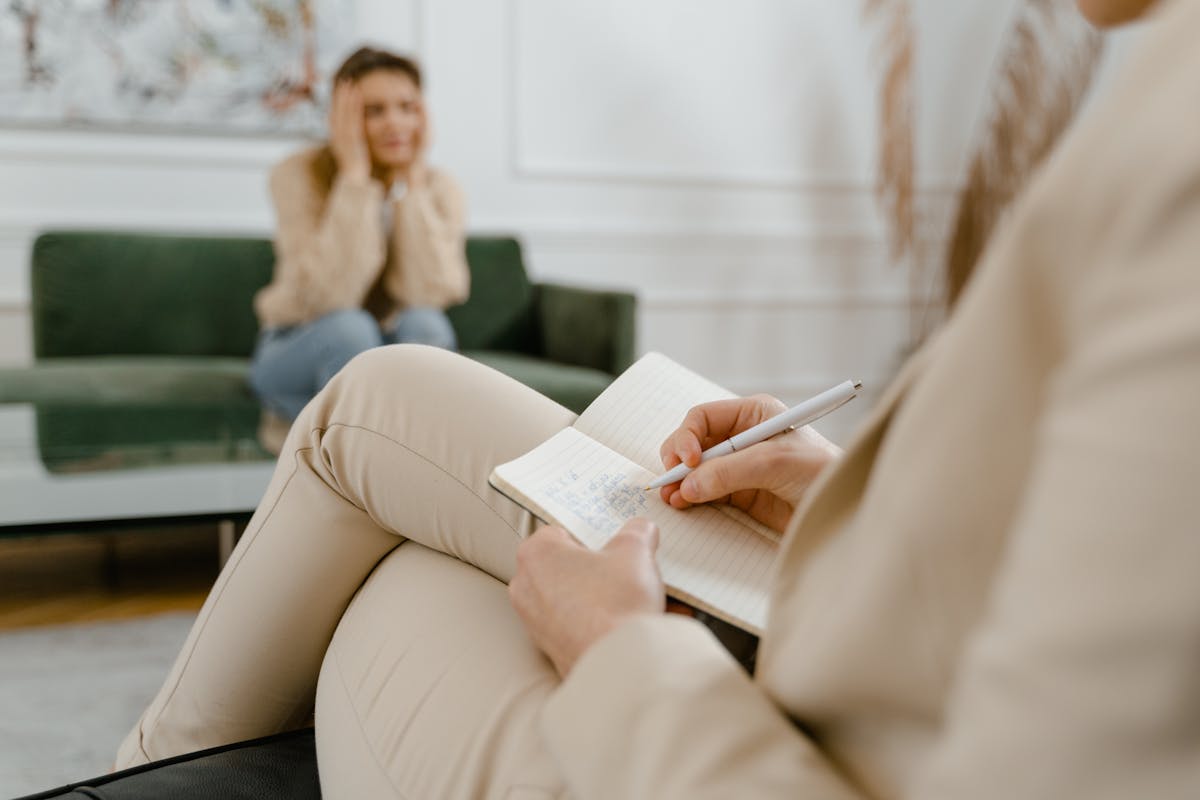
Writing down thoughts and concerns helps organize your preparation
What to Bring and Leave Behind for Your First Therapy Session
Bringing the right materials to your first therapy session can help you feel prepared and make the most of your time. Most importantly, bring any paperwork your therapist's office has requested, such as intake forms, insurance cards, and identification. Having these documents ready prevents delays and allows more time for actual therapeutic work.
Essential Items to Bring:
- Insurance card and photo identification
- Completed intake forms (if provided in advance)
- List of current medications and dosages
- Contact information for other healthcare providers
- Small notebook or phone for taking notes (if desired)
- Payment method for any copays or fees
- Water bottle to stay hydrated
- Tissues (therapy offices usually have them, but having your own can be comforting)
If you've been working with other mental health professionals, bringing relevant records or contact information can help your therapist coordinate care. This is particularly important if you're dealing with complex conditions that might benefit from integrated treatment approaches.
Consider bringing a list of questions you'd like to ask your therapist. This might include questions about their experience, therapeutic approach, what to expect from treatment, or specific concerns about your situation. Writing these down beforehand ensures you don't forget important topics during the session.
Some people find it helpful to bring a journal or notebook where they've written down thoughts, patterns they've noticed, or specific incidents they want to discuss. While not necessary, having these written reminders can help you communicate more effectively, especially if you tend to get nervous or forget things when talking.
What to leave behind is equally important. Try to leave expectations of immediate solutions, pressure to share everything at once, and the need to impress your therapist. Therapy is a process, and your first session is just the beginning.
Avoid bringing distractions that might interfere with your focus. While it's fine to have your phone for emergencies, consider putting it on silent and storing it away. The therapy hour is a unique opportunity to be fully present with your thoughts and feelings without external interruptions.
If you're someone who processes emotions through creative expression, you might consider bringing artwork, poetry, or music that represents your current emotional state. While not all therapists incorporate creative elements, many find these materials helpful for understanding their clients' experiences.
For those considering therapy as part of addiction recovery, you might bring information about your substance use patterns, recovery goals, or questions about treatment options. Understanding different approaches, such as flexible residential programs, can help you make informed decisions about your recovery path.
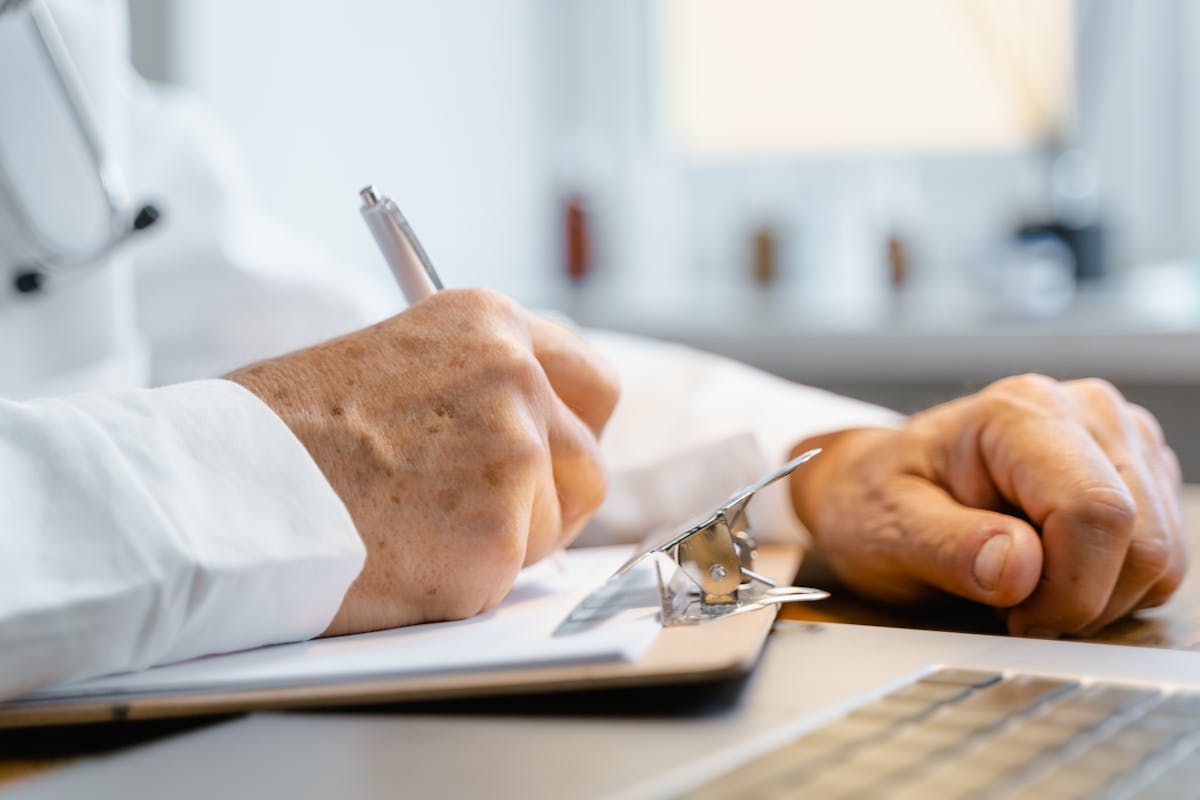
Simple preparation materials can help you feel organized and confident
Overcoming Common First Therapy Session Anxieties
Anxiety about your first therapy session is not only normal but almost universal. Understanding and addressing these common concerns can help you approach your appointment with greater confidence and openness. The fear of being judged tops the list of therapy-related anxieties, but it's important to remember that therapists are trained to provide unconditional acceptance and support.
Many people worry about not knowing what to say or fear they'll freeze up during the session. This concern often stems from the misconception that you need to have profound insights or articulate problems perfectly. In reality, your therapist is skilled at helping you explore and express your thoughts and feelings, even when they feel jumbled or unclear.
The fear of being "too much" or overwhelming your therapist with your problems is another common anxiety. Therapists are trained to handle intense emotions and difficult situations. They've chosen this profession specifically to help people work through challenging experiences, and they're equipped with tools and techniques to support you regardless of what you're facing.
🌟 Reframe Your Thinking
Instead of viewing therapy as something being "done to you," think of it as a collaborative partnership where you're the expert on your own experience.
Some individuals worry about crying in front of their therapist or showing vulnerability. Emotional expression is not only expected in therapy but welcomed as a sign of engagement and progress. Therapists understand that healing often involves processing difficult emotions, and they're prepared to support you through tears, anger, or any other emotional responses.
For those dealing with addiction or mental health stigma, there may be additional concerns about being labeled or facing discrimination. It's worth noting that therapeutic relationships are protected by strict confidentiality rules, and seeking help for substance use or mental health concerns is increasingly recognized as responsible self-care rather than personal failure.
Financial anxiety about therapy costs can also create stress. Many people worry about the expense of ongoing treatment. If cost is a concern, discuss this openly with your therapist or treatment center. Many facilities offer various insurance options and payment plans to make treatment accessible.
Common Worries and Realities:
- Worry: "I'll be judged for my problems" | Reality: Therapists are trained in non-judgmental acceptance
- Worry: "I won't know what to say" | Reality: Your therapist will guide the conversation
- Worry: "My problems aren't serious enough" | Reality: All concerns deserve attention and support
- Worry: "Therapy won't work for me" | Reality: Research shows therapy is effective for most people
- Worry: "I'll be forced to change too quickly" | Reality: You control the pace of your therapeutic work
The concern about therapy "not working" or being a waste of time often reflects past disappointments or unrealistic expectations about the therapeutic process. Therapy is a gradual process that requires time and commitment. According to the American Psychological Association, most people begin to see improvement within the first few sessions, but lasting change typically requires several months of consistent work.
If you're attending therapy as part of addiction recovery, you might worry about discussing substance use honestly or fear being pressured into specific treatment approaches. Quality addiction counselors understand that recovery is a personal journey, and they'll work with you to develop an approach that fits your needs and circumstances.
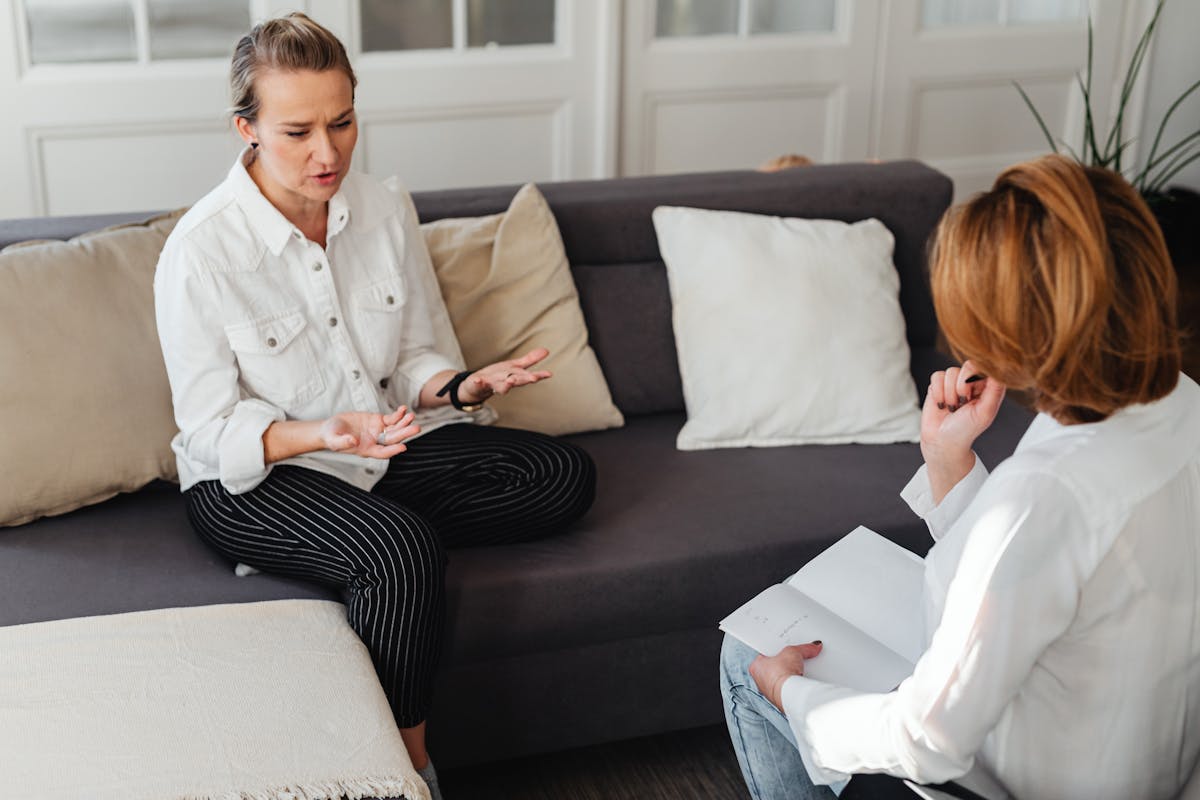
Addressing anxiety beforehand helps you approach therapy with confidence
Essential Questions to Ask Your Therapist During Your First Session
Asking questions during your first therapy session demonstrates engagement and helps you determine if the therapist is a good fit for your needs. Remember, you're interviewing them as much as they're assessing you. A good therapeutic relationship requires mutual respect and understanding, so don't hesitate to ask about anything that's important to you.
Start with questions about their experience and qualifications. Ask about their educational background, licensing, and specific experience with concerns similar to yours. If you're dealing with addiction, ask about their training in substance abuse treatment and familiarity with different recovery approaches.
Questions About Their Approach:
- What therapeutic approaches do you use, and why do you think they'll be helpful for my situation?
- How do you typically structure therapy sessions?
- What should I expect in terms of homework or activities between sessions?
- How do you measure progress in therapy?
- What role do you see me playing in my own recovery/healing process?
Understanding their communication style and availability is crucial for building a working relationship. Ask about their policy for contact between sessions, how they handle crisis situations, and what to do if you need support outside of regular appointments. This information is particularly important if you're dealing with addiction or severe mental health symptoms.
Don't hesitate to ask about their experience with your specific concerns. Whether you're seeking help for anxiety, depression, trauma, addiction, or relationship issues, understanding their expertise in your area of need helps you feel confident in their ability to help you.
Questions About Logistics and Expectations:
- How often do you recommend we meet, and for how long?
- What's your cancellation policy?
- How do you handle insurance claims and billing?
- What happens if I need to miss sessions or take breaks from therapy?
- How will we know when it's time to reduce session frequency or end therapy?
If you're considering therapy as part of a broader treatment plan, ask about their approach to coordinating care with other professionals. This might include psychiatrists for medication management, addiction counselors, or other specialists involved in your care. Understanding how they communicate with your broader healthcare team ensures comprehensive, coordinated treatment.
For those exploring treatment options for addiction, ask about their philosophy regarding different recovery approaches. Some therapists integrate evidence-based techniques like DBT skills into their practice, while others focus on specific therapeutic modalities.
Finally, trust your instincts about the therapeutic relationship. Ask yourself whether you feel heard, understood, and respected during your first session. A good therapist will welcome your questions and respond with patience and professionalism.
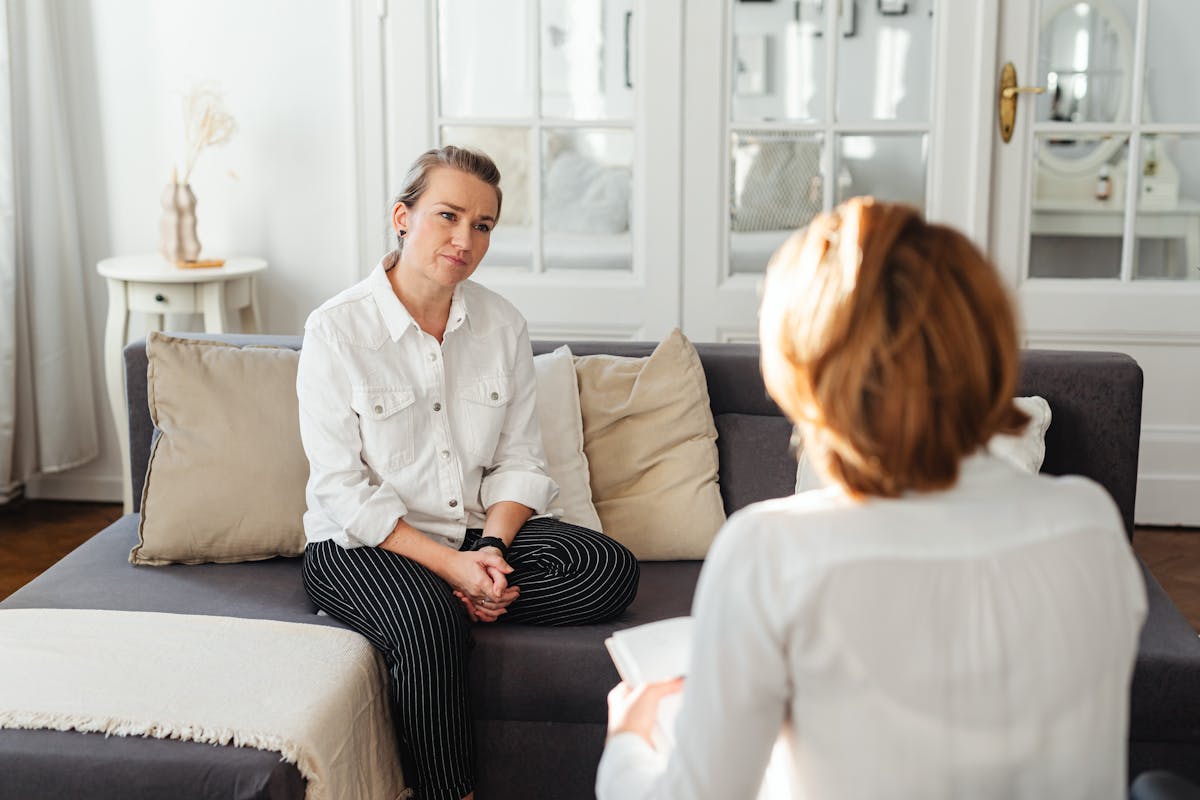
Open communication builds the foundation for effective therapy
Setting Realistic Goals and Expectations for Your First Therapy Session
Setting appropriate expectations for your first therapy session helps prevent disappointment and creates a foundation for productive therapeutic work. The primary goal of your initial appointment is assessment and relationship building, not solving all your problems. Understanding this distinction can help you approach the session with realistic expectations and patience for the process ahead.
Your first session goals should focus on establishing comfort and trust with your therapist, clearly communicating your main concerns, and beginning to understand how therapy might help you. Avoid expecting immediate relief from symptoms or profound insights that will transform your life overnight. These outcomes develop gradually through consistent therapeutic work.
Think of your first therapy session like a first date – you're getting to know each other, seeing if there's compatibility, and determining whether you want to continue building the relationship. The real work happens in subsequent sessions.
Consider setting process goals rather than outcome goals for your first session. Process goals might include speaking honestly about your concerns, asking important questions about treatment, or simply getting through the session without excessive anxiety. These achievable goals help you feel successful and motivated to continue.
If you're seeking therapy for addiction recovery, your first session goals might include openly discussing your relationship with substances, understanding different treatment approaches available, and beginning to explore what recovery means to you. This foundation-setting is crucial whether you're considering outpatient programs or more intensive treatment options.
Immediate Goals (First Session)
Establish rapport with your therapist, communicate main concerns clearly, understand the therapeutic process, and determine if this is a good fit.
Short-term Goals (First Month)
Develop trust and comfort in the therapeutic relationship, begin identifying patterns and triggers, start learning basic coping skills.
Medium-term Goals (3-6 Months)
Make noticeable progress on primary concerns, develop stronger coping mechanisms, see improvements in daily functioning and relationships.
Long-term Goals (6+ Months)
Achieve significant symptom reduction, maintain positive changes independently, develop resilience for future challenges.
Be prepared for the possibility that progress might not be linear. Some sessions might feel incredibly productive, while others might seem less impactful. This variation is normal and doesn't indicate that therapy isn't working. Sometimes the most important therapeutic work happens between sessions as you process and integrate insights.
Discuss your expectations openly with your therapist during your first session. They can help you understand what's realistic given your specific situation and goals. This conversation also helps them tailor their approach to meet your needs and preferences.
For those dealing with co-occurring mental health and addiction issues, goal-setting might be more complex. Your therapist might recommend addressing immediate safety concerns first, then gradually working toward broader recovery goals. Understanding this prioritization helps maintain realistic expectations about the therapeutic timeline.
🎯 Goal-Setting Tip
Write down 2-3 specific, measurable goals you'd like to achieve through therapy. Share these with your therapist so they can help you create a roadmap for achieving them.
Remember that therapy is an investment in your long-term wellbeing. While you might not see dramatic changes immediately, consistent participation in the therapeutic process typically yields significant benefits over time. Many people find that therapy not only helps with their initial concerns but also improves their overall quality of life and relationships.

Setting realistic goals creates a roadmap for therapeutic success
Making the Most of Your First Therapy Session
Once you're in your first therapy session, focus on being present and authentic rather than trying to impress your therapist or say the "right" things. Your therapist is trained to understand that first sessions can be awkward and that it takes time to feel comfortable sharing personal information with a stranger.
Be honest about your nervousness or uncertainty. Acknowledging these feelings actually demonstrates self-awareness and can help your therapist understand how to support you best. Many people find that simply naming their anxiety about therapy helps reduce its intensity and creates a more relaxed atmosphere.
Don't feel pressured to share everything at once. While it's important to give your therapist enough information to understand your concerns, you can pace yourself and share more personal details as trust develops. Some information may be more relevant later in treatment, and that's perfectly fine.
Pay attention to how you feel during the session. Do you feel heard and understood? Does your therapist seem genuinely interested in helping you? Are their responses thoughtful and relevant to your concerns? These observations help you assess whether this therapeutic relationship will be beneficial.
Ask for clarification if you don't understand something your therapist says or suggests. This might include therapeutic terms, treatment recommendations, or homework assignments. A good therapist will appreciate your questions and take time to ensure you understand their approach.
If you're seeking therapy for addiction-related concerns, be honest about your substance use patterns and recovery goals. Your therapist needs accurate information to provide appropriate support, and they're bound by confidentiality rules that protect your privacy. Discussing your relationship with substances openly helps them understand whether you might benefit from specialized addiction treatment services.
Take mental notes about what feels helpful during the session. Did certain questions prompt useful insights? Were there moments when you felt particularly understood or supported? Reflecting on these positive aspects helps you communicate with your therapist about what works best for you.
Don't worry about crying, getting emotional, or experiencing strong reactions during your session. Emotional responses are normal and often indicate that you're accessing important feelings or memories. Your therapist is prepared to support you through these moments and views them as valuable parts of the therapeutic process.
Before the session ends, make sure you understand next steps. This might include scheduling follow-up appointments, completing homework assignments, or implementing specific strategies between sessions. Having clear action items helps maintain momentum and gives you concrete ways to continue working on your goals.
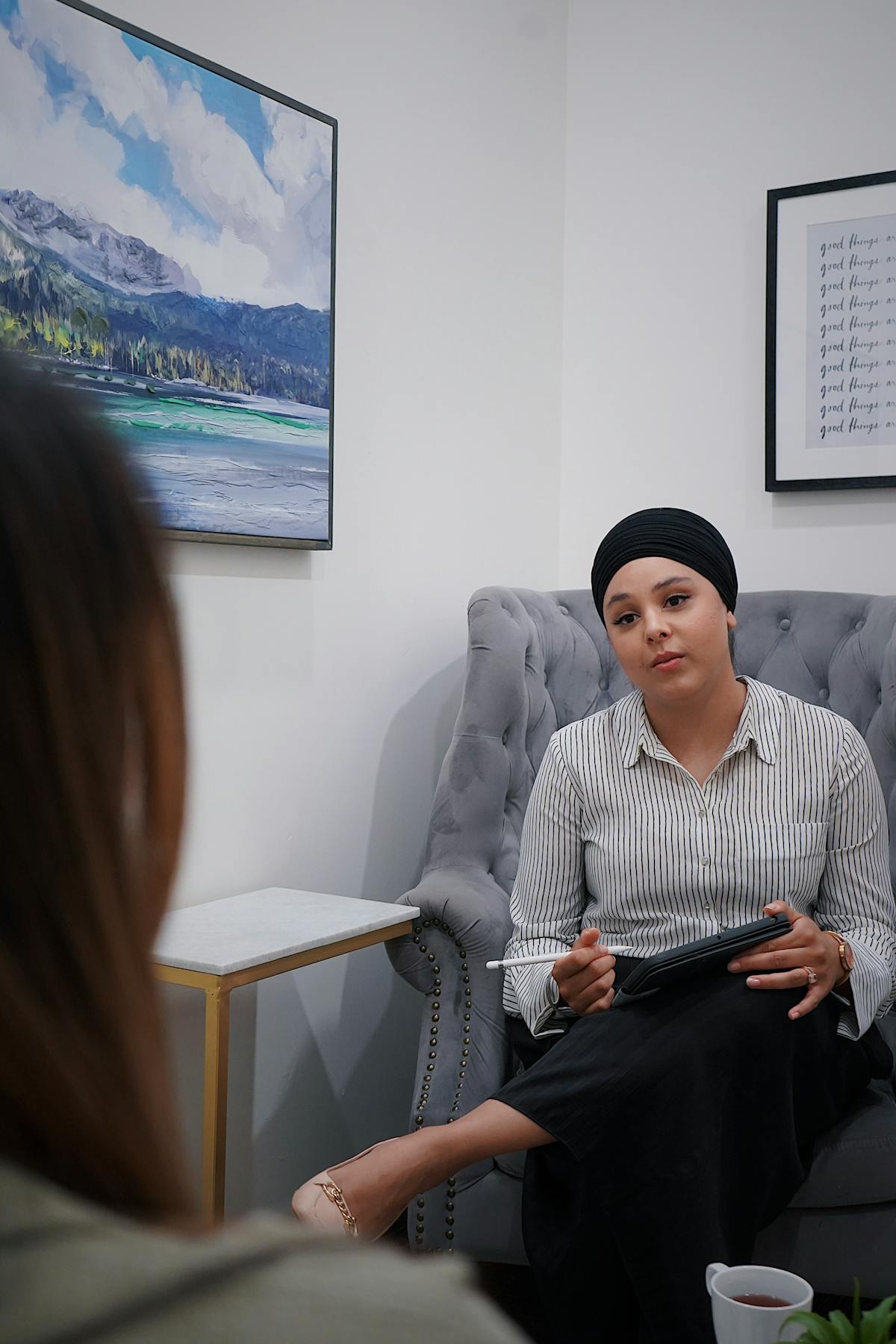
Authentic engagement during your session builds therapeutic trust
What Happens After Your First Therapy Session
The period immediately following your first therapy session is crucial for processing the experience and determining your next steps. Many people feel a mixture of relief, emotional exhaustion, hope, and uncertainty after their initial appointment. These varied reactions are completely normal and reflect the significance of taking this step toward better mental health.
Give yourself time to decompress after your session. Avoid scheduling demanding activities immediately afterward if possible. Some people feel energized and want to continue reflecting on insights from therapy, while others feel drained and need rest. Both responses are valid, and honoring your needs helps you integrate the therapeutic experience.
Consider keeping a brief journal of your thoughts and feelings after each session. Write down key insights, homework assignments, or topics you want to explore further. This practice helps you remember important details and track your progress over time. Many people find that writing about therapy experiences deepens their self-understanding.
📝 Post-Session Reflection
Take 10-15 minutes after your session to write down your immediate reactions, insights, and any questions that arose. This helps consolidate the therapeutic work and prepares you for future sessions.
Evaluate whether you felt comfortable with your therapist and their approach. While some initial nervousness is expected, you should feel generally respected, heard, and hopeful about working together. If something felt significantly off or uncomfortable, trust your instincts and consider whether this is the right therapeutic match for you.
If your therapist gave you homework or suggested activities to try between sessions, make a plan for implementing these recommendations. This might include practicing relaxation techniques, monitoring mood patterns, or completing specific exercises. Following through on these suggestions demonstrates commitment to the therapeutic process and often accelerates progress.
For those exploring therapy as part of addiction recovery, the first session often raises questions about treatment intensity and approach. You might find yourself considering whether more intensive treatment options would be beneficial or wondering about additional support services.
Don't be surprised if you experience some emotional stirring in the days following your first session. Therapy can activate feelings and memories that have been suppressed or avoided. This process, while sometimes uncomfortable, is often a sign that therapeutic work is beginning to address important issues.
Schedule your next appointment if you haven't already done so. Maintaining consistent therapy sessions is crucial for building momentum and developing a strong therapeutic relationship. Many therapists recommend weekly sessions initially, though the frequency might vary based on your needs and circumstances.
Reach out to your support network if you need to process the therapy experience. Trusted friends or family members can provide encouragement and help you maintain perspective as you begin this journey. However, remember that the specific content of your therapy sessions should remain confidential.
If you experienced any significant distress during or after your session, don't hesitate to contact your therapist's office. They can provide clarification, additional support, or schedule an earlier follow-up session if needed. Many therapists expect some adjustment period and are available to help you navigate initial challenges.

Reflection after your session helps integrate the therapeutic experience
Building a Strong Therapeutic Relationship Over Time
The therapeutic relationship is the foundation of successful treatment, and it develops gradually through consistent interaction and mutual respect. Your first session is just the beginning of this important relationship, and understanding how to nurture it can significantly impact your treatment outcomes.
Trust develops slowly in therapeutic relationships, and it's normal to need several sessions before feeling completely comfortable with your therapist. Be patient with yourself and the process. Share feedback about what feels helpful and what doesn't, as this communication helps your therapist adjust their approach to better meet your needs.
Consistency in attendance and engagement demonstrates commitment to the therapeutic process and helps build momentum in your treatment. While occasional schedule conflicts are inevitable, prioritizing your therapy appointments sends a message to both yourself and your therapist that this work is important to you.
Remember that the therapeutic relationship is collaborative. You're not a passive recipient of treatment but an active participant in your own healing and growth. Your insights, feedback, and commitment are just as important as your therapist's expertise.
Be prepared for the relationship to evolve over time. Early sessions might focus on building rapport and understanding your concerns, while later sessions might involve deeper exploration of patterns, traumas, or core beliefs. This progression is natural and reflects the deepening trust and understanding between you and your therapist.
Don't hesitate to address concerns about the therapeutic relationship directly with your therapist. If something feels uncomfortable, unclear, or unhelpful, bringing it up for discussion often strengthens the relationship and improves treatment effectiveness. Good therapists welcome this kind of feedback and view it as valuable therapeutic material.
For those working on addiction recovery, the therapeutic relationship often becomes a model for other healthy relationships in your life. Learning to trust, communicate openly, and maintain boundaries with your therapist can translate into improved relationships with family, friends, and colleagues.
Understand that therapeutic relationships have appropriate boundaries that differ from friendships or family relationships. Your therapist maintains professional boundaries to ensure the relationship serves your therapeutic needs rather than their personal ones. These boundaries actually create safety and allow for deeper therapeutic work.
Many people find that their therapeutic relationship becomes one of the most honest and supportive relationships in their lives. This experience can be profoundly healing, especially for those who have experienced difficult or traumatic relationships in the past. The unconditional positive regard that characterizes good therapy can help repair trust and self-worth.
Consider the therapeutic relationship as a safe space to practice new ways of relating to others. This might include expressing needs directly, setting boundaries, or working through conflicts constructively. These skills, developed in therapy, often improve all your relationships.
Remember that ending therapy, when appropriate, is also part of the therapeutic relationship. Good therapists help you recognize when you've achieved your goals and are ready to maintain progress independently. This process, often called termination, is planned collaboratively and helps you transition to maintaining mental health on your own.
If you're working with multiple providers as part of comprehensive treatment, such as through a treatment team approach, your individual therapist often serves as a central coordinating figure who helps integrate various aspects of your care.

Strong therapeutic relationships develop through consistent engagement and mutual respect
Your Journey Toward Healing Begins Now
Preparing for your first therapy session is an act of courage and self-compassion that deserves recognition. By taking the time to understand what to expect, prepare practically and emotionally, and approach the experience with realistic goals, you're setting yourself up for a positive and productive therapeutic journey.
Remember that seeking therapy is a sign of strength, not weakness. It demonstrates your commitment to personal growth, mental health, and creating positive changes in your life. Whether you're addressing anxiety, depression, addiction, trauma, or any other concern, therapy provides a supportive environment for healing and transformation.
Your first therapy session is just the beginning of your healing journey. With proper preparation, realistic expectations, and commitment to the process, therapy can become a powerful tool for creating lasting positive changes in your life.
The insights, coping strategies, and self-awareness you develop through therapy extend far beyond the therapy room. Many people find that therapeutic work improves their relationships, enhances their resilience, and provides them with tools for navigating life's challenges more effectively.
Trust the process, be patient with yourself, and remember that healing takes time. Your first therapy session is a significant step toward better mental health and a more fulfilling life. Allow yourself to feel proud of taking this important step toward caring for your emotional wellbeing.
If you find that therapy brings up questions about more intensive treatment options or specialized services, don't hesitate to explore these possibilities. Many people benefit from comprehensive treatment approaches that address multiple aspects of mental health and wellbeing.
Ready to Take the First Step Toward Better Mental Health?
Don't let anxiety or uncertainty prevent you from accessing the support you deserve. Our experienced, compassionate therapists are here to help you navigate life's challenges and build the skills you need for lasting wellbeing. Whether you're dealing with anxiety, depression, addiction, or other mental health concerns, we provide personalized therapy and treatment services designed to meet your unique needs.
Take the courageous step toward healing and growth. Your future self will thank you for prioritizing your mental health today.
📞 Call 804-655-0094Connect with a caring mental health professional and learn how preparing for your first therapy session can set you up for therapeutic success.

